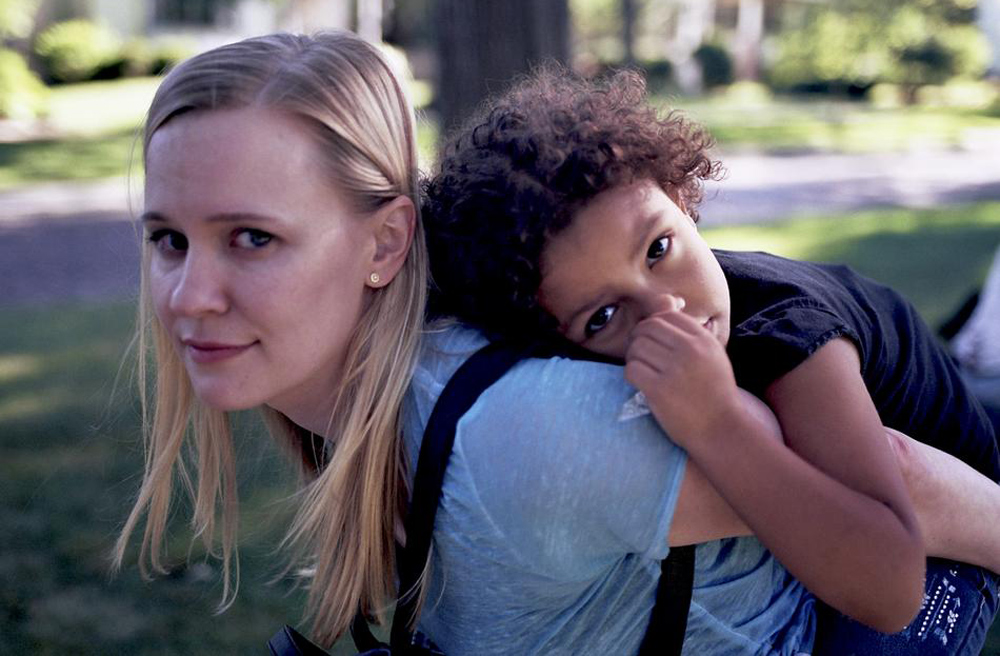From the look of things in “Saint Frances,” you wouldn’t think Bridget (Kelly O’Sullivan) would have trouble with words. She got into Northwestern with plans to major in creative writing and she certainly talks a good game, breezing through a job interview to be a nanny with a “take-it-or-leave-it” confidence that is surprising given the lack of opportunities there would seem to be for her elsewhere with her lack of work experience. Yet in getting the gig to take care of Maya (Charin Alvarez) and Annie (Lily Mojekwu)’s young daughter Frances (Ramona Edith-Williams), albeit after their preferred first choice comes and goes, you quickly come to realize all the things she’s left unsaid over the years out of self-protection and the experiences she’s had to go through alone when a few words to a friend might’ve turned the tide.
That the writing/directing duo of O’Sullivan and first-time feature director Alex Thompson are around when the bough breaks proves to be an exhilarating experience as you see Bridget gain steam from taking care of a real force of nature in Frances, a forthright six-year-old whose progressive parents have already instilled a strong sense of confidence, particularly when it comes to body positivity. When the subject of menstruation is broached, Frances is far more comfortable talking about it than any of the adults, and it happens to come up often since Bridget is prone to bleeding, and while it’s something she isn’t all too excited to talk about, O’Sullivan and Thompson are, opening up all sorts of conversations that are rarely touched on in any medium with a deceptively simple yet sprawling multigenerational portrait of women.
In becoming Frances’ nanny, Bridget deals with the usual burden of domestic work, unsure of where she fits into the lives of the family she’s been hired by, doing highly personal work while attempting to keep a professional distance, but she’s pulled in directions you haven’t seen before in frank, starkly funny exchanges with both Frances and her two mothers, who all together represent a spectrum of feminism where you can see how Maya and Annie want to bring up a child to be part of a more caring and conscientious world than the one they were raised in. However, for as much strength can be gained from idealism, it can also leave one hopelessly unprepared for reality, as Annie experiences firsthand when she gives birth to a second child and struggles to put a brave face on her postpartum depression and when combined with the emotional issues Bridget is having that she’s reluctant to identify as such, as an unwanted pregnancy crops up with a lovely guy (Max Lipchitz) she doesn’t see a future with, “Saint Frances” is utterly refreshing once the two start talking to each other about their problems.
It’s an exceptional showcase for O’Sullivan as both a screenwriter and as an actress, bringing light in any number of ways to sensitive subject matter and completely effervescent as the lead, but the film is generous in its spotlight, drawing on the brilliant community of theater actors from its Chicago setting to give all the characters such richness. Alvarez and Mojekwu make a formidable pair as the married Maya and Annie, who leave no need for the filmmakers to explain how they’ve been battle-tested, doing with a glance what pages of exposition could not, though they are always at risk to be upstaged by the frisky Edith-Williams, who is as poised a screen presence as they come, even at six. Still, it’s wrong to infer that these women ever could be positioned against one another when “Saint Frances” does such a beautiful job of articulating how much power there is when they share their experiences with one another and work together. Naturally, it’s a film you’ll be eager to share with others yourself.
“Saint Frances” will screen at SXSW on March 15th at the Alamo Lamar B at 5:15 pm.




